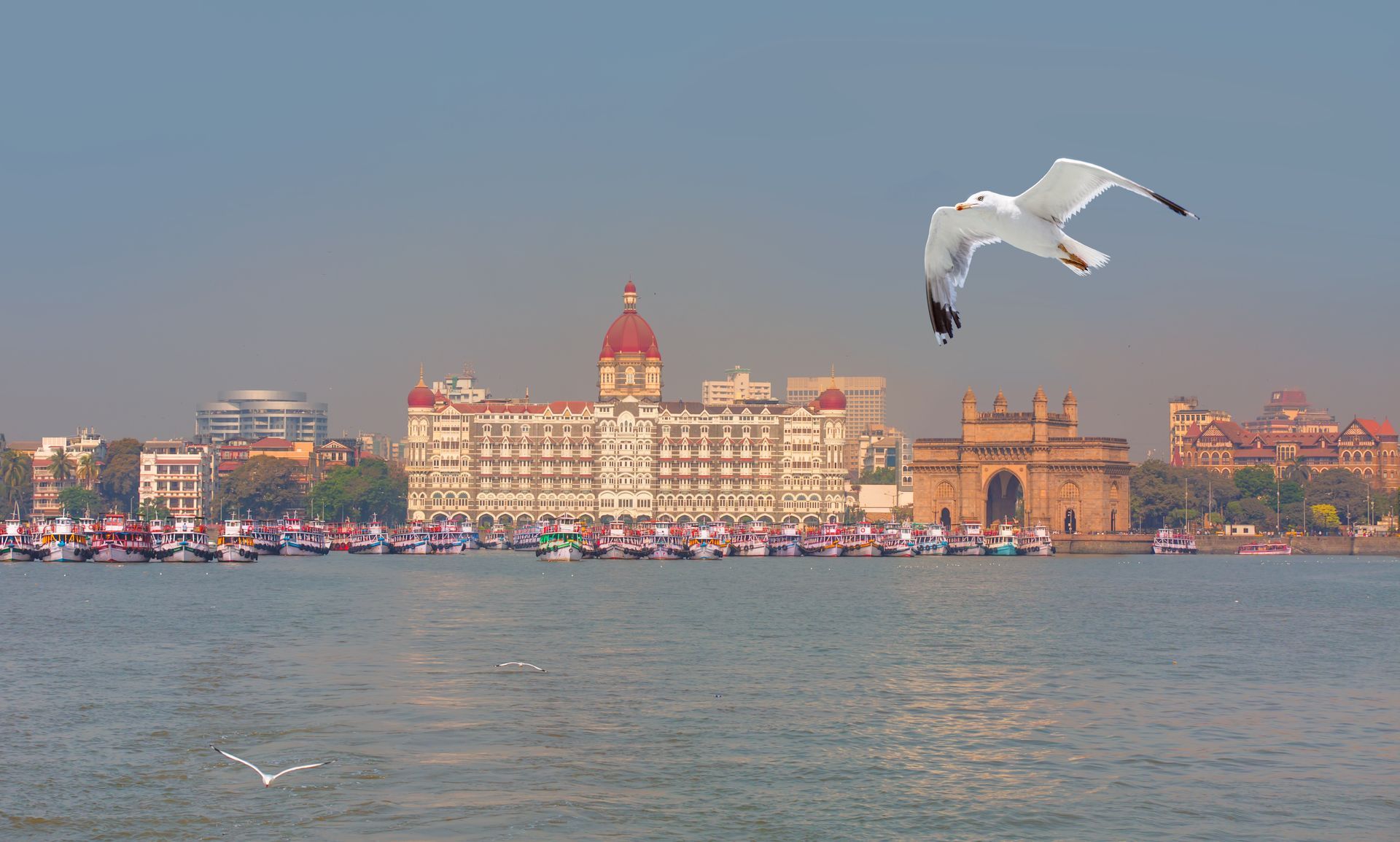
general information
Estimate Nominal GDP
(2025): $ 4.27 trillion
Estimate GDP from the Ocean Economy
(2024) approximately 4% of total GDP
General Coastline
approximately 7,516.6 kilometres
Estimate Population
(2024): 1.467.342.305
Registered In-Country Companies
over 2.8 million
UN Global Compact Participants by April 2025
400

overview
India presents a strategic environment for advancing a safe and sustainable ocean economy, particularly after hosting the G20 and the Ocean20 (O20) Dialogue. The country’s ocean economy is vast, with industries spread across remote and rural areas. However, implementation of ocean-related policies remains weak, and stakeholder consultation at the state level is limited. A central focus is enhancing safety and sustainability standards in ports and shipyards, including alignment with the national government’s "Zero Accident Programme." The Ocean Centres initiative in India seeks to address these gaps by fostering multi-stakeholder collaboration and driving progress toward a just, resilient blue economy.
Advancing a Safe and Sustainable Ocean Economy in india
The Scoping Phase in India focused on establishing a baseline and critically analysing national initiatives, guidelines, regulations, stakeholder engagement and recent studies in the Blue Economy. It also sought to identify sub-sectors’ specific challenges in Indian Ocean industries and across key value chains.
Despite the country’s vast ocean economy, India faces significant barriers to growth. There is a notable lack of financial and human capital investments directed toward technology and innovation in the Indian Blue Economy. Additionally, limited awareness, insufficient research, and inadequate capacity-building initiatives hinder the adoption of safety and sustainability practices across ocean industries. Environmental threats such as declining marine biodiversity, rising sea levels, increasing ocean temperatures, extreme weather events, and broader climate change impacts jeopardize the country’s food, economic, and human security. Compounding these issues, Sustainable Development Goal (SDG) 14 — Life Below Water — remains one of the least prioritized goals by the private sector.
At the same time, India holds significant opportunities to expand its ocean economy. The Indian private sector is well-positioned to excel in developing port infrastructure, ship manufacturing, shipping services, and related business initiatives. These advancements can contribute meaningfully to the country’s economic growth and GDP, while also aligning with the Viksit Bharat Mission 2047 (Developed India Mission 2047). The blue economy offers pathways for sustainable development, inclusive growth, employment generation, and marine conservation. Furthermore, it can be expanded through innovative blue financing products — such as blue bonds, loans, and derivative instruments — to support sustainable ocean industry projects.
Several unexpected insights emerged during the scoping phase. Shipbuilding and shipping were identified as key contributors to India’s blue economy. The importance of ocean resources, maritime infrastructure, and coastal management services became evident, not only for economic growth and sustainability but also for national security. A significant share of the country's oil and gas is transported by sea, underscoring the Indian Ocean region's strategic role in national development. Additionally, fisheries and marine minerals were highlighted as crucial components, with India’s coastal economy supporting approximately 4 million fishermen and numerous coastal towns.

India faces several major obstacles in addressing safety challenges across its ocean industries. There is a widespread lack of adherence to human factors and a weak safety culture within ports. The marine manufacturing sector presents strong entry barriers and is associated with high operational risks, deterring new actors. Additionally, the limited availability of innovative financing mechanisms significantly hampers the development and implementation of safe and sustainable activities and projects.
When it comes to safety in ocean industries, India faces critical gaps. Ports often show low adherence to safety culture and human factor considerations, while marine manufacturing is characterized by high entry barriers and operational risk. Access to innovative financing mechanisms for safe and sustainable practices is still limited.
However, India also presents significant opportunities for advancing safety in ocean industries. Integrating safety and sustainability into the core of industrial activities — including research and innovation, infrastructure development, financing, cost reduction, and skills training — can strengthen long-term resilience. Strategic investment in Science, Technology, and Innovation (STI) can further support these efforts. Offshore energy operations stand to benefit from enhanced risk assessments, capacity-building, and emergency preparedness. Fostering inclusive, safe work environments and protecting marine biodiversity through Marine Protected Areas and sustainable fishing practices are also key opportunities for progress.
The priorities of india’s Ocean Centres across the four Action Areas are ranked as follows:
1
Shipping &
Ports
2
Fishing & Aquaculture
3
Offshore
Renewables
4
Finance &
Investment
At the national level, the Ocean Centres initiative in India aims to drive a just transition to a blue economy by embedding safety into all ocean-related industrial activities. It will emphasize awareness-building, research, and capacity development; promote marine biodiversity protection; stimulate investment in sustainable marine tourism; and advance offshore renewables to meet national energy transition goals.
At the collective level, India’s participation is expected to contribute to global learning on transitioning from brown to blue economies through targeted research, the creation of national safety data systems, and the formation of multistakeholder coalitions. The initiative will also enable the development of sub-sector-specific guidelines and promote the use of standard indicators to track progress in ocean sustainability.
We believe that, at a global level, the Ocean Centres initiative will strengthen food security, port efficiency, clean energy development, and biodiversity protection. As hubs for sustainable ocean stewardship, they will drive long-term economic and environmental benefits through collaboration, innovation, and investment.
OCEAN CENTRES, INDIA
local guidances
Shipping & Ports
Fishing & Aquaculture
Offshore Renewables
Finance & Investment
local news
List of Services
-
Assessing the Value of Offshore Wind for India’s Power System in 2030 – Report by CEEW and SSEF IndiaAssessing the Value of Offshore Wind for India’s Power System in 2030 – Report by CEEW and SSEF
-
Blue Economy: Enhancing Growth & Sustainability IndiaBlue Economy: Enhancing Growth & Sustainability
-
Developing Drone Technology for Live Fish Transport IndiaDeveloping Drone Technology for Live Fish Transport
-
Development 100 Climate Resilient Coastal Fishing Villages IndiaDevelopment 100 Climate Resilient Coastal Fishing Villages
-
Development of Integrated Aqua Parks to boost the Fisheries Sector IndiaDevelopment of Integrated Aqua Parks to boost the Fisheries Sector
-
Group Accident Insurance Scheme (GAIS) IndiaGroup Accident Insurance Scheme (GAIS)
-
IFC Partners with Axis Bank to provide a $500 Million Climate Loan to India to finance Green / Blue projects IndiaIFC Partners with Axis Bank to provide a $500 Million Climate Loan to India to finance Green / Blue projects
-
India’s Blue Economy Potential and Draft Policy Framework IndiaIndia’s Blue Economy Potential and Draft Policy Framework
-
Installation of artificial reefs across coastal states to support sustainable marine fisheries conservation efforts IndiaInstallation of artificial reefs across coastal states to support sustainable marine fisheries conservation efforts
-
Kisan Credit Card to Fishers & Fish Farmers IndiaKisan Credit Card to Fishers & Fish Farmers
-
Maritime Fund to spur INR 1.5 Trillion investment by 2030 IndiaMaritime Fund to spur INR 1.5 Trillion investment by 2030
-
National Accounting for the Ocean and Ocean Economy IndiaNational Accounting for the Ocean and Ocean Economy
-
Ocean Ecosystem Accounts in India – A Framework IndiaOcean Ecosystem Accounts in India – A Framework
-
Ocean Finance: Financing the transition to a Sustainable Ocean Economy IndiaOcean Finance: Financing the transition to a Sustainable Ocean Economy
-
PM Modi Inaugurates Vizhinjam Port In Kerala — India's First Deep-Water Container Transshipment Facility IndiaPM Modi Inaugurates Vizhinjam Port In Kerala — India's First Deep-Water Container Transshipment Facility
-
Strategic Focus on Fisheries Cluster Development IndiaStrategic Focus on Fisheries Cluster Development
-
Strengthening India’s Maritime Sector: The role of GIST-IFSC IndiaStrengthening India’s Maritime Sector: The role of GIST-IFSC
-
Uniform Ban on Fishing for 61 days IndiaUniform Ban on Fishing for 61 days
local events
List of Services
-
Inaugural Session of UNGCNI’s Knowledge Series on Business and Biodiversity by UNGCNI IndiaInaugural Session of UNGCNI’s Knowledge Series on Business and Biodiversity by UNGCNI
-
5+5 Ocean Decade Conference-2025 India5+5 Ocean Decade Conference-2025
-
Building Ethical Leadership in ESG & Compliance by UNGCNI IndiaBuilding Ethical Leadership in ESG & Compliance by UNGCNI
-
Conference on AI for Oceans by Marine Technology Society IndiaConference on AI for Oceans by Marine Technology Society
-
Conference on Climate Change and Energy Modeling by NITI Aayog IndiaConference on Climate Change and Energy Modeling by NITI Aayog
-
ESG Summit by National Institute for Micro, Small and Medium Enterprises IndiaESG Summit by National Institute for Micro, Small and Medium Enterprises
-
India & Sustainability Standards Conference by Centre for Responsible Business IndiaIndia & Sustainability Standards Conference by Centre for Responsible Business
-
Sustainability Conference by Indian Institute of Management, Bangalore IndiaSustainability Conference by Indian Institute of Management, Bangalore




